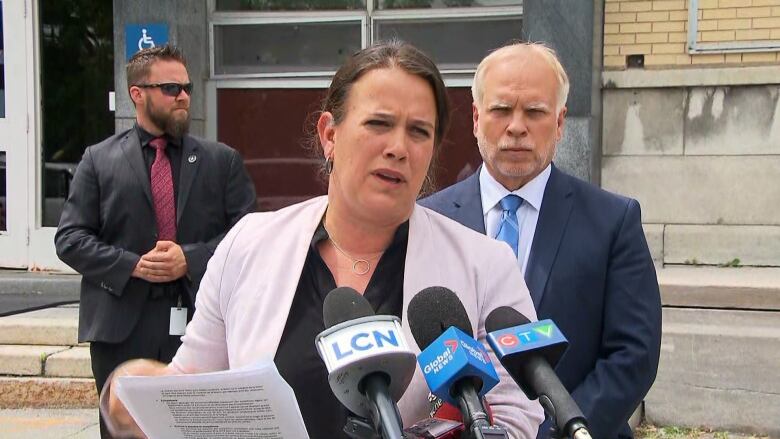Quebec expands monkeypox vaccination efforts as virus continues to spread
Outbreak traced to late-April superspreader event that led to several anonymous transmissions

With 132 confirmed cases in Quebec, the province's interim director of public healthsays the spread ofmonkeypox is slowly progressing every day and now vaccination efforts are expanding to men who expect to have sexual contact with other men in Montreal this summer.
Quebec has 40,000 doses of the vaccine and Montreal officials expect 25,000 doses will cover the target population in the city.
"There are certainly cases we haven't seen because it is an insidious disease that doesn't show many symptoms," said Dr. Luc Boileau during a news conference Monday.
Montreal's public health director, Dr. Mylne Drouin, said the city is the epicentre of the North American outbreak.
So far, more than 3,000 vaccine doses have been administered, with officials focusing on those who may have been exposed to the virus. Now, the vaccine is available to any manwho may have sex with other men in the coming months, said Drouin.
"By enlarging the vaccination, we are trying to prevent the spread, knowing that we will have visitors, we will have different events, that will put people at risk," she said.
"I don't know that we can have zero cases, but we think we can at least manage the current outbreak and minimize the number of new cases."
Superspreader event in Montreal
It is believed a traveller attended an event now considered a superspreader event in Montreal at the end of April and that led totransmission in the community, withcases cropping up in May, she explained.
That superspreader event happened around the same time as other outbreaks developedinseveral European cities, she noted.
The fact that there are many anonymous contacts stemming from this eventmakes it harder to track down potential transmissions and contain the disease, Drouin said.
So far, 126 cases have been investigated in Montreal and there were three hospitalizations. Currently, there are no patients in hospital and mostcases are not severe, she said.
Drouin said 100 per cent of the cases in Montreal are men, and most had sexual contact with other men. She said the disease is largely spreading through prolonged, intimate,skin-to-skin contact.
"Currently we have an outbreak that is really focused on a specific community," she said.
"For the general population, we are not seeing new chains of transmission that could link to other groups of the population."
This is similar to what Canada's chief public health officer, Dr. Theresa Tam, said late last week.
She said all of the patients are males between the ages of 20 and 63, and the majority of them had sexual contact with other men, but she stressed that the infection can spread to anyone who is exposed through close contact with an infected person or contaminated objects.
WHO discussing monkeypox situation
The World Health Organization will convene an emergency committee next week to discuss monkeypox, as globally there have been 1,600 confirmed and 1,500 suspected cases of monkeypox this year and 72 deaths in 39 countries, including those where the virus usually spreads. Monkeypox is endemic in parts of Africa.
Boileau said public health is working to address the issue in Montreal and the rest of Quebec.
"We have made a lot of interventions, in particular here in Montreal," said Boileau.
According to Quebec public health, monkeypox can spread from the onset of symptoms until the scabs covering the skin lesions have fallen off and a healthy layer of skin has formed. The incubation period is usually week or less, but can last up to 21 days.
In most cases, the illness resolves on its own in twoto fourweeks and complications are rare, the health agency says, and high-risk contacts may get vaccinated with a single dose within four days of exposure.












_(720p).jpg)


 OFFICIAL HD MUSIC VIDEO.jpg)
.jpg)



























































































